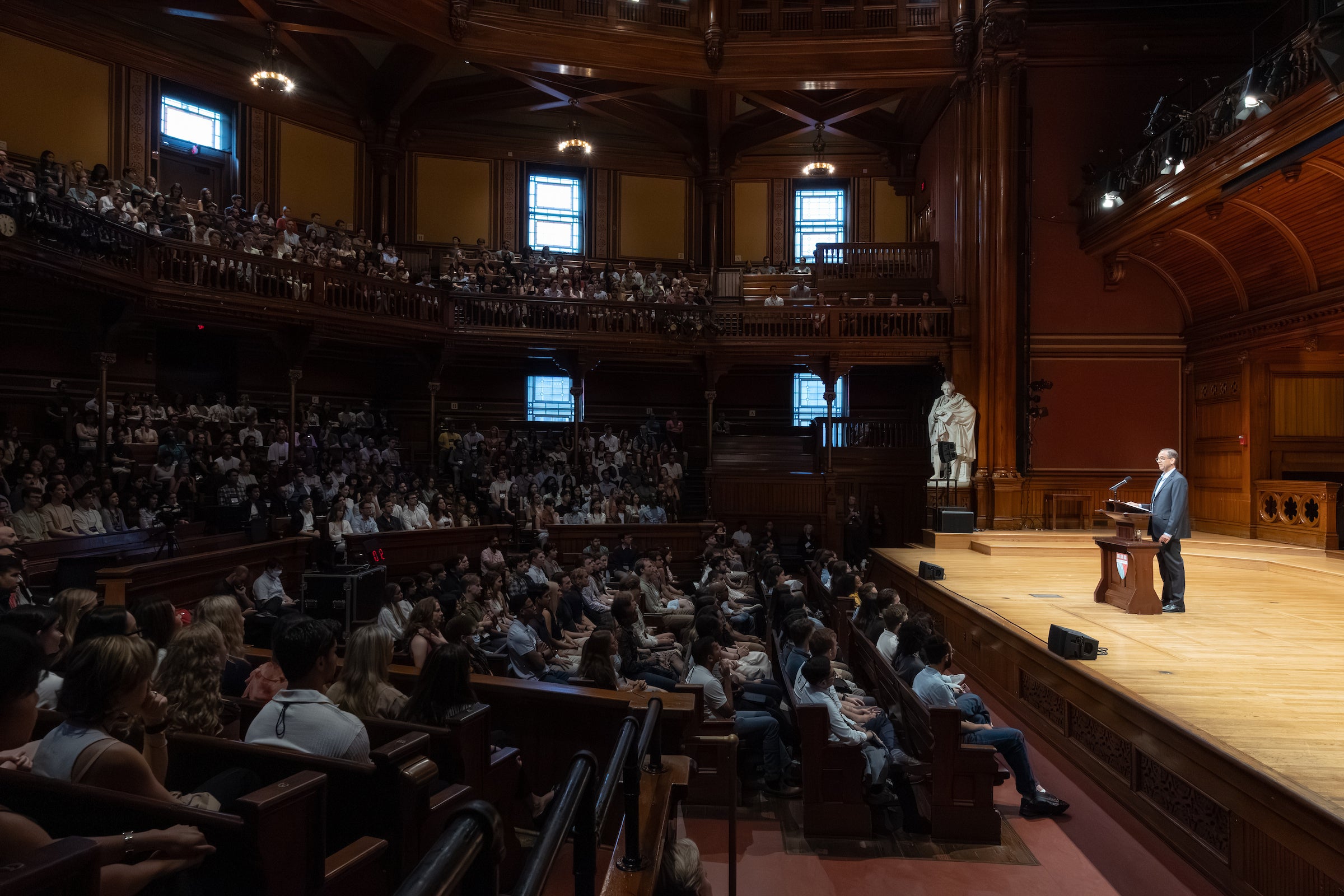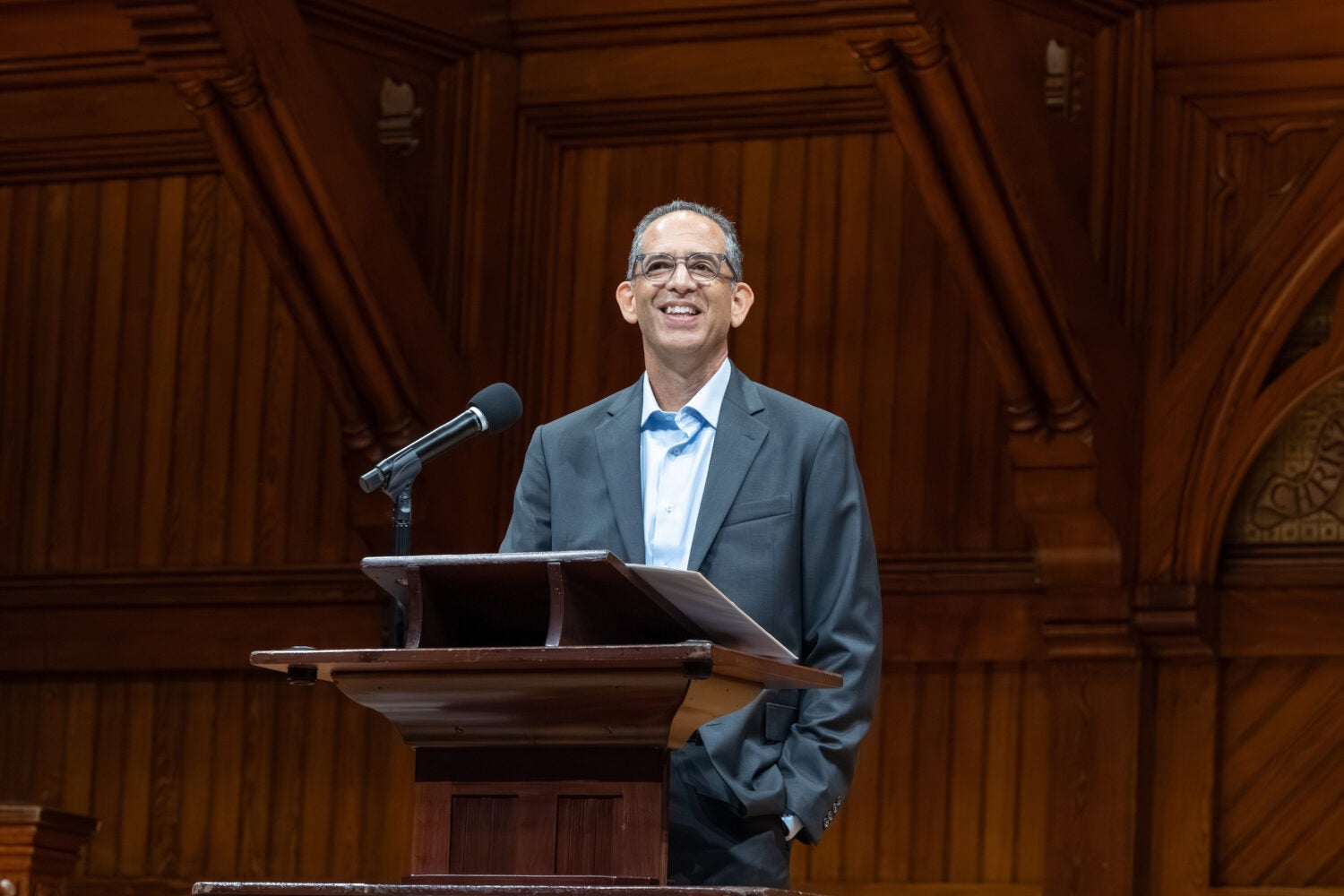Incoming Harvard Law School students are joining a “very special community,” one in which they will learn, grow, challenge, and be challenged — and one in which their thoughtful contributions are critical to maintaining this vibrant, unique place, Dean John Goldberg said on Monday.
In remarks delivered at Harvard’s historic Sanders Theatre, Goldberg welcomed 580 J.D., 188 LL.M., and eight S.J.D. students, as well as 37 transfer J.D. and four international exchange students, to the law school campus, congratulating them on the accomplishments that led them to Harvard Law, and urging them to bring their many talents and skills to “a community devoted to studying, understanding, and improving the law.”
“Whatever your background, whatever your path here, each of you has earned your place in this academic community,” said Goldberg, the Morgan and Helen Chu Dean and Professor of Law at Harvard.
Among the incoming students, he noted, are residents of nearly every U.S. state and countries around the world; former prosecutors, judges, and diplomats; Phi Beta Kappa inductees, Fulbright scholars, and Congressional Gold Medal awardees; teachers, concert pianists — and even a koi fish rescuer and an oyster farmer.
The law, Goldberg told his audience, is “deeply paradoxical,” at once rooted in history and yet ever evolving. “Great lawyers are those who manage to proceed forward, thoughtfully, in the face of seeming contradictions.”
Goldberg encouraged the new students to embrace all that Harvard Law has to offer, including academics and clinical experiences, extracurriculars, and more — while continuing to foster a community known for intellectual vigor, reflection and debate, and mutual respect.
“Learning the law is about appreciating and accepting our differences, while setting rules that allow us to resolve them peacefully and constructively,” he said.

This may be difficult, but it is also necessary, Goldberg said. “It is the job of each generation — in other words, it is soon to be your job — to do what can be done to make sure that the promise of law is realized.”
Goldberg suggested that the impact of this work cannot be overstated. “At their best, lawyers and law help to sustain the rule of law and the fragile political ecosystem known as liberal democracy,” he said. “They do so by giving us a common framework through which to resolve, or at least manage, our conflicts.”
Honing these skills can also make one a better thinker, a better lawyer, and even a better person, Goldberg explained.
“What it means to be a lawyer, to think like a lawyer, is to appreciate this complexity, to accept that law and life are complicated and messy, and to still move forward, constructively, toward the good, the just, and the right,” he said.
“What it means to be a lawyer … is to accept that law and life are complicated and messy, and to still move forward, constructively, toward the good, the just, and the right.”
The rich array of backgrounds, life experiences, and experiences represented at Harvard Law School is both an advantage and an opportunity for aspiring members of the bar, Goldberg noted. “A key to becoming a good lawyer is learning how to hear and engage seriously and respectfully ideas with which one disagrees, not to mention the people who espouse them.”
He urged the newest members of the Harvard Law School community to always “extend the generosity and kindness that one instinctively offers to friends and allies to all members of our community, even those whose views conflict with your own.”
Striving to understand different perspectives and getting to know the people behind them, Goldberg said, can lead to “true friendships — or, at the very least, collegial and productive rivalries.”
The dean also cautioned students to avoid “the oppressive effects of intellectual complacency and conformism — groupthink.” “Back in 1859, in his famous essay ‘On Liberty,’ the philosopher John Stuart Mill argued that, in modern mass democracies, prevailing opinion can be as coercive as tyrannical officials,” said Goldberg, a scholar of political philosophy. Noting that Mill’s insight has only become more salient in the age of social media, he urged audience members to avoid the type of performative discourse that maximizes clicks on the internet and to instead engage with each other with thought, care, and on the merits.
“Whether debating in a classroom or a hallway, or posting online, or lodging a request or even a complaint, you must always remember that you have chosen to enter a community, and a profession, that is premised on the idea that reason, rules, and mutual respect are the path to knowledge and to justice,” Goldberg concluded. “That path is now your path. Remain true to it.”
Want to stay up to date with Harvard Law Today? Sign up for our weekly newsletter.
